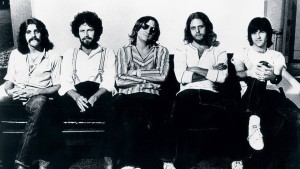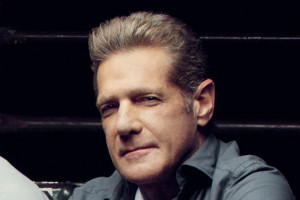Lemmy. Bowie. Frey. Three titans of rock music, and all gone within one month of each other like three very bright lights being shut off at the same time. Click, click, and click. The music world is darker and is hurting with the losses of these great men, all of which were beloved, respected and revered for their massive contributions to popular music. Lemmy was the ultimate rebel, an uncompromising beast who did it his way all the way to the end. David Bowie was the consummate chameleon, effortlessly moving between artistic mediums. Glenn Frey? He was a songwriting genius in the visual package of the guy next door, yet was much more. He was a driven man who knew the worth of his talent, was very adaptable musically, and had an uncanny ability to craft incredible rock songs.
Glenn Frey was an everyman who made it very, very big. He was the son of an auto factory worker in Michigan whose talent, ambition, and singular drive to succeed made him an icon in the music industry, both with his seminal band The Eagles, and in his later solo work. Originally part of the late 1960s Detroit scene, he made his aural debut on Bob Seger’s “Ramblin’, Gamblin Man” in 1968. Frey came from the Golden Era in Rock music during the late 1960s and early 1970s. This was a time when creativity and innovation were the driving force of success, and anything was possible. The bar of excellence was incredibly high, and this spurned an intense rivalry and creativity, resulting in some of the best and most memorable music ever recorded. When Glenn Frey met Don Henley in Los Angeles in 1970, a songwriting partnership on par with the best in music history was formed. Within a year of meeting, the two formed the Eagles, who as we all know went on to be one of the most successful rock acts in history.
In the beginning, Frey and Henley split lead vocal duties (but usually collaborated in writing the songs themselves), and due to this, most of Frey’s most memorable songs came from this early period (1971-1975). These included classics like “Take It Easy” (with Jackson Browne), “Tequila Sunrise”, “Peaceful, Easy Feeling”, “Already Gone”, “Lyin’ Eyes”, and later, “Heartache Tonight”. Frey had a unique talent for coining terms and titles that perfectly complemented the content of the song he was working on. For example, Glenn and Henley were in a bar, watching a scantily clad woman flirt with a man and Frey exclaimed “Look at that one over there. Look at those lyin’ eyes”. From this observation, he and Henley wrote a “story” of this encounter, and within a couple of days, it became “Lyin’ Eyes”. He also coined the title of the mega-hit “Life in the Fast Lane”, which came to him during a ride with an infamous drug dealer who (after Frey asked him to slow down) said “It’s only life in the fast lane!”
Stylistically, Frey (and the Eagles with him) began more as “country rock”, and were pioneers in bridging the gap between what was considered “country” and what was considered “rock” along  with bands like Poco and the Flying Burrito Brothers. They blended the storytelling of country music (along with that style’s instrumentation) with a rock and roll attitude. This combination was a winner from the start, and the band was a runaway success. Despite the positive reception to their (at the time) signature sound, Frey and Henley grew tired with the musical constraints of their material and longed to branch out and try something new. This transition started with 1974’s “Already Gone”, a break up tune written by Frey’s friends Tempchin and Strandlund. What made this song so different is that it had some real meaty guitar riffs and solos that were generally uncharacteristic of the Eagles in their current incarnation. Further pushing them away from country rock was the addition of guitar maestro Don Felder, whose incendiary solo on “Already Gone” added a more powerful sound to the band.
with bands like Poco and the Flying Burrito Brothers. They blended the storytelling of country music (along with that style’s instrumentation) with a rock and roll attitude. This combination was a winner from the start, and the band was a runaway success. Despite the positive reception to their (at the time) signature sound, Frey and Henley grew tired with the musical constraints of their material and longed to branch out and try something new. This transition started with 1974’s “Already Gone”, a break up tune written by Frey’s friends Tempchin and Strandlund. What made this song so different is that it had some real meaty guitar riffs and solos that were generally uncharacteristic of the Eagles in their current incarnation. Further pushing them away from country rock was the addition of guitar maestro Don Felder, whose incendiary solo on “Already Gone” added a more powerful sound to the band.
The group then gradually morphed into the arena rock form that was evident in the later years of the band, and especially after guitar slingers Joe Walsh and Don Felder joined. This transition of styles was unique because instead of losing their audience as the changed, they actually got bigger. By 1976’s Hotel California and 1980’s The Long Run, the band was arguably the biggest in the world and at the top of their game. Frey and Henley had refined their craft to the point of pop perfection with a combination of great harmonies, catchy songs, and now often monstrous guitar licks. At the peak of their success, the Eagles imploded in 1980, and did not unite until 1994’s Hell Freezes Over. In the concert special for the reunion, Frey’s dry humor took center stage during “Tequila Sunrise”. Glenn just said “we never broke up, just took a fourteen year vacation”.
During his tenure with the Eagles, Frey won six Grammy awards and sold millions of albums. Frey’s solo career post Eagles was also quite successful. Peaking in 1983 with songs like “You Belong to the City” and “The Heat is On”, Frey kept himself in the public eye. He scored a top 20 hit in 1984 with “Smuggler’s Blues”. He also did work on movie soundtracks such as Beverly Hills Cop, Ghostbusters II, and Thelma and Louise.In addition, Frey was a busy actor, particularly in the 1980s. He was on such hits as Miami Vice, and was a regular on the 1990s show Nash Bridges He later played a cheapskate pro football GM in the hit movie Jerry McGuire. The producers of Jerry McGuire needed a real “hard ass” to play this role. True to his reputation, someone recommended Glenn Frey. He was perfect for that role.
Glenn Frey the man was a little more understated, but his intensity and manic attention and focus drove the Eagles to their tremendous success. He was also realistic enough to realize that even though he was a good singer, Don Henley was even better. The two wrote the bulk of the Eagles later material to suit Henley’s vocal style, knowing it would be more marketable due to its versatility. It takes a big man to admit that the group would be stronger with another voice. Frey was a “big picture” kind of guy and also was known for having a great sense of humor. As far as Glenn’s personal life, he tried to keep that very private. He was married twice and had three children with his second wife, Cindy. His health was not particularly strong later in his life, and while he was recovering from intestinal surgery, Frey died at age 67. Frey’s legacy will lie in his musical contributions, which were immense. He and Don Henley will be ranked as a songwriting team along with the likes of John Lennon & Paul McCartney and Paul Simon & Art Garfunkel.
He was that good! RIP…
[si-contact-form form=’3′]

 January 20th, 2016
January 20th, 2016  CEO
CEO 
 Posted in
Posted in  Tags:
Tags: 



